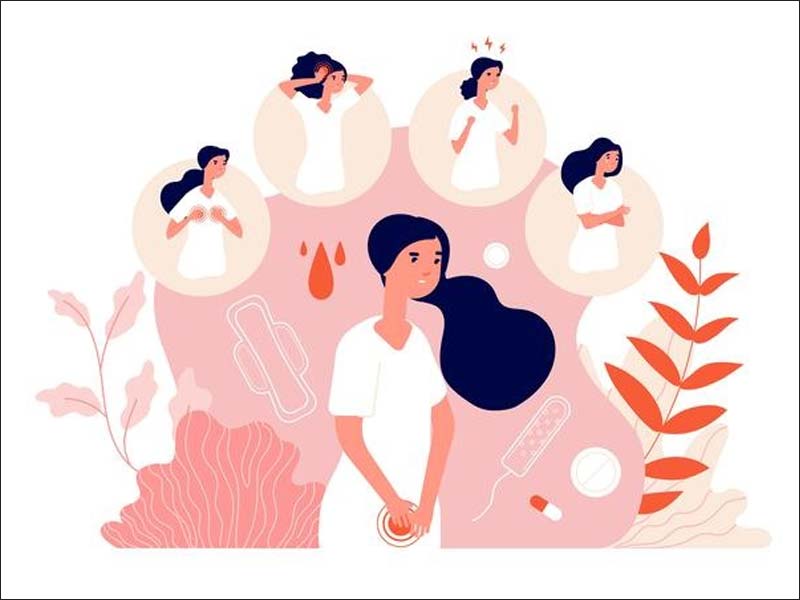
Periods brings with it its share of challenges. However, the days leading to it are no less. Over 90% of women experience physical and emotional symptoms 5-10 days before they start menstruating. Cramps, bloating, irritability, depressed mood, and crankiness are some of the symptoms of what is called premenstrual syndrome, or PMS. This largely happens due to the fluctuation in hormonal levels. However, there are ways to manage, or at least prevent, the PMS symptoms. And to know them, Onlymyhealth spoke to Dr Seema Sharma, Senior Consultant, Obstetrics & Gynecology, Paras Hospitals, Gurugram.
Table of Content:-
What Causes The Premenstrual Syndrome?
Before we know the tips on managing the PMS symptoms, let us know why it happens in the first place. “PMS is a very common condition,” said Dr Sharma, so much so that over 90% of women experience some of the symptoms, she added. The symptoms generally develop 5 to 11 days before the start of periods and disappear as menstruation begins. Although the exact cause is presently not known, researchers attribute it to a change in sex hormones and serotonin levels. Serotonin is a hormone that stabilises mood, emotions and induces a feeling of happiness. Also, the level of estrogen, which is one of the two female sex hormones, rises during the first half of the menstrual cycle and decreases in the second half. In some women, during PMS, the serotonin level drops as the estrogen level dips, which means the serotonin level is quite low in the two weeks before the start of periods. “Women who have a low serotonin level are likely to experience PMS symptoms,” said Dr Sharma.
Premenstrual Syndrome (PMS) Symptoms

(Photo Credit: Freepik)
While PMSing, a woman experiences symptoms, such as:
- Tension
- Anxiety
- Depressed mood
- Crying spells
- Mood swings, irritability and anger
- Appetite changes
- Cravings for certain foods
- Trouble falling asleep
- Social withdrawal
- Poor concentration
Also read: How to Deal with PMS Food Cravings
What Are The Ways To Manage PMS Symptoms?

(Photo Credit: Freepik)
PMS can be difficult. Gladly, there are ways to manage its symptoms. Here is what Dr Sharma suggested:
1# Diet
We all know how important it is to have a balanced diet. But, do you know it can help you with PMS too? Having a balanced nutritious diet can help relieve some of the PMS symptoms. Hence, have lots of fruits and vegetables, whole grains, and complex carbohydrates. At the same time, limit your intake of fat, salt and sugar. This will also ensure good health in the long run.
2# Exercise
Have you noticed you feel happy and relaxed after you work out? This is because your body releases chemicals called endorphins, which uplifts mood. As anxiety, stress and depressed mood are among the PMS symptoms, hence make it a point to work out regularly.
3# Manage Stress
It is easier said than done. But managing stress is not just helpful regarding PMS, it is extremely crucial for both physical and mental health. Deep breathing, meditation, stretching and yoga are some of the ways you can do it. Being well-rested by getting at least 7-8 hours of sleep daily is also important.
4# Avoid Caffeine And Alcohol
Both of these are stimulants that can further aggravate stress, anxiety, crankiness and anger that one might experience during PMS. Hence, try to avoid caffeine and alcohol as much as you can. Also, quit smoking.
5# Take Supplements
Although a balanced diet, regular exercise and stress management can be extremely helpful in managing the PMS symptoms, however, sometimes these are not enough. One other tip in this regard is to take a magnesium supplement.
6# Go For Therapy
If none of these helps, you must consider therapy. Getting medical help might help you with the issue considerably.
Also read: Try these Natural Therapies to Fight Symptoms of PMS
So, you can follow these tips to get relief from your PMS woes.
(With inputs from Dr Seema Sharma, Senior Consultant, Obstetrics & Gynecology, Paras Hospitals, Gurugram)
Photo Credit: Freepik
Also watch this video
How we keep this article up to date:
We work with experts and keep a close eye on the latest in health and wellness. Whenever there is a new research or helpful information, we update our articles with accurate and useful advice.
Current Version